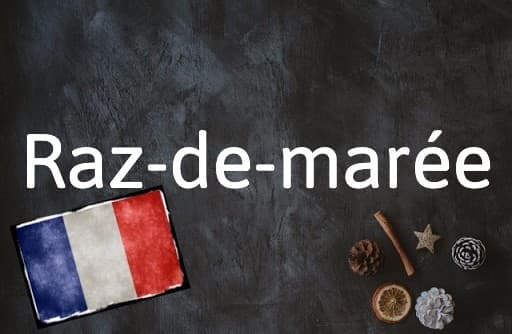French Expression of the Day: Raz-de-marée

This geographical term is becoming more common in everyday speech.
Why do I need to know Raz-de-marée?
Because its meaning has moved beyond the original use of the word and made it into daily conversation.
What does it mean?
Raz-de-marée, sometimes written raz de marée and pronounced "rah duh mah-ray", is a French expression used to denote a massive wave/tidal wave/tsunami.
The Larousse online dictionary defines it as "an enormous wave that can reach 20-30 metres in height, caused by a storm, volcanic eruption, an earthquake or landslide."
Hopefully those conditions will not apply to readers of The Local.
But the figurative sense of the expression certainly will: "A brutal and massive phenomenon that disturbs a social or political situation".
The term has been employed to describe the pandemic like so:
La cinquième vague s'est muée en raz-de-marée - The fifth wave has mutated into a tsunmai
Olivier Véran a parlé d'un "raz de marée" pour qualifier les contaminations - Olivier Veran spoke about a tidal wave to describe the contamination
But it can also be used in a political sense, normally to describe a crushing election victory - otherwise known as a landslide election win.
Le parti a étendu son emprise sur le pouvoir par un raz de marée électoral - The party extended its grip on power with a massive election win
La ville symbole du raz-de-marée de La République en marche en 2017 pourrait virer au champ de mines en 2022 - The town that was symbolic of the République en Marche landslide victory in 2017 could turn into a mine field in 2022
Synonyms
To talk about Covid, we can also use the terms: vague and even méga-vague.
It is common to use weather metaphors to describe social/political upheavals in French. You could also use for example: tempête sociale/economique, tremblement de terre politique and tsunami electoral.
Comments (1)
See Also
Why do I need to know Raz-de-marée?
Because its meaning has moved beyond the original use of the word and made it into daily conversation.
What does it mean?
Raz-de-marée, sometimes written raz de marée and pronounced "rah duh mah-ray", is a French expression used to denote a massive wave/tidal wave/tsunami.
The Larousse online dictionary defines it as "an enormous wave that can reach 20-30 metres in height, caused by a storm, volcanic eruption, an earthquake or landslide."
Hopefully those conditions will not apply to readers of The Local.
But the figurative sense of the expression certainly will: "A brutal and massive phenomenon that disturbs a social or political situation".
The term has been employed to describe the pandemic like so:
La cinquième vague s'est muée en raz-de-marée - The fifth wave has mutated into a tsunmai
Olivier Véran a parlé d'un "raz de marée" pour qualifier les contaminations - Olivier Veran spoke about a tidal wave to describe the contamination
But it can also be used in a political sense, normally to describe a crushing election victory - otherwise known as a landslide election win.
Le parti a étendu son emprise sur le pouvoir par un raz de marée électoral - The party extended its grip on power with a massive election win
La ville symbole du raz-de-marée de La République en marche en 2017 pourrait virer au champ de mines en 2022 - The town that was symbolic of the République en Marche landslide victory in 2017 could turn into a mine field in 2022
Synonyms
To talk about Covid, we can also use the terms: vague and even méga-vague.
It is common to use weather metaphors to describe social/political upheavals in French. You could also use for example: tempête sociale/economique, tremblement de terre politique and tsunami electoral.
Join the conversation in our comments section below. Share your own views and experience and if you have a question or suggestion for our journalists then email us at [email protected].
Please keep comments civil, constructive and on topic – and make sure to read our terms of use before getting involved.
Please log in here to leave a comment.